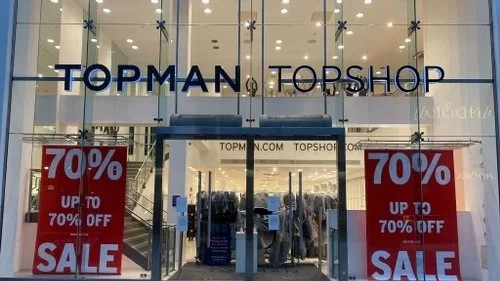Acquisition of Arcadia businesses and Debenhams sparks tax crisis
Img Source: SkyThe constant rapid acceleration of the digital world continues as Asos acquires Arcadia’s former brick-and-mortar giants Topshop, Topman and Miss Selfridge for £300 million. Boohoo, an online competitor of Asos, bought the online business and brand of Debenhams for £55 million a couple weeks ago, a tiny shadow of what Debenhams was once worth. The come up of these two businesses seemed to have been strokes of genius, their growth exceeding expectations with the pandemic. And it seems to be the beginning of the end of our high street retail brands, with hundreds of stores closed and 25,000 jobs at risk as a result of this deal. This deal brings about a real concern for the future of our brick-and-mortar retail brands.
One Topshop worker shared his thoughts.
"There's lots of people who've been there for many years, and obviously, when [Asos] is just taking the digital side of it, there's so many people that work in the stores. It's really sad for company."
He said that while coronavirus "hasn't helped" the closure of physical stores would "leave a big gap".
"People still want to shop in person. It is good doing online shopping, but what then replaces the High Street? There's going to be nothing left, eventually, if all these companies keep buying up [brands]."
Asos was launched in 1999, under the name As Seen On Screen, and they sold clothes worn by TV stars online. Nowadays, CEO Nick Beighton has led Asos to £3.3 billion in sales. They gambled by putting their trust in the world wide web and succeeded. Their tax bill came to just £28.8 million last year. Perhaps it should've been larger considering their rapid acceleration of sales as a result of the pandemic.
Boohoo, amidst allegations of slave labour in a Leicester warehouse, have achieved a 44% rise in sales last year to bring their total to £1.2 billion.
Asos and Boohoo paid a mere £48.1 million tax on £4.5 billion sales last year, compared to the £160 million paid by the Arcadia group and Debenhams. This brings about a trend; the failing retail businesses are paying more tax while losing money, almost being driven to bankruptcy, whilst the booming online businesses are paying less tax and swimming in dollars and profit. And with Debenhams being reported to have claimed £41 million furlough cash between April and October, the fee for taxpayers could well exceed £100 million. This trend could bring about the end of our high street. Is that a bad thing or a good thing?
Well, think about it. Would you rather go outside with your friends or family, spend cash on clothes you’ve seen and examined in real life, try them on, and buy them then and there? Or perhaps you’d rather buy your clothes online, where your only proof of the existence of this piece of clothing is a picture that might not even resemble the real thing, you are unable to try on this clothing, see how it looks on you and see if it is the right size and fit, but get it delivered to you in the comfort of your own home at your convenience. I would definitely go for the first one, however many people, despite preferring the first option, are still a regular online clothing customer, due to the sheer convenience of getting it delivered to your door. I must throw my hands up and say I am guilty of this. And since many of us are currently unable to purchase clothes from brick-and-mortar stores, we have been constantly feeding companies like Asos and Boohoo profit.
However this is not just something that has come about with the pandemic. Think about the last time you heard about Debenhams before their acquiring. A long time ago right? In fact, even before the pandemic they were a failing business. Our digital world has been growing for a long time before this pandemic, and Debenhams would’ve eventually been eaten up anyway due to the tax dilemma and digitisation. The pandemic has only sped things up, and it seems that our retail world is edging closer than we think to complete digitisation.
However if our world does in fact go online, then what does that mean for all the jobs lost in the process? Asos and Boohoo are planning to open up new warehouses across the country bringing thousands of job opportunities with them, however our constant technology and AI obsession could label these jobs as redundant within the next few decades. Many people working at brick-and-mortar stores will have no place to go. If this whole world is automated, the rich will get richer, the poor will get poorer, and the majority of people would be unable to make ends meet. Not much of a democracy, is it. Seems a tad bit unethical, and it seems like that’s where we’re heading.

